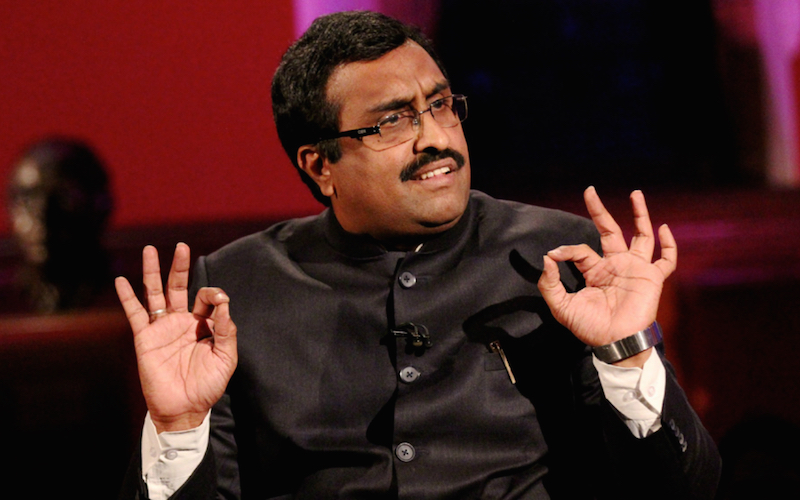
Why a Unified India isn’t that Frightening
It is easy to see why Pakistanis, Bangladeshis, Sri Lankans, Afghanis, and others could be frightened by Ram Madhav’s, General Secretary of India’s ruling BJP, belief that countries of the Indian subcontinent should all reunite, culturally and politically, into a greater unified India. It could be seen as a denial of the 1947 partition of British India and as Indian expansionism into smaller neighboring states. It is so much more than that. It is a mission for peace and forgiveness on a subcontinent of mistrust and rivalry.
The controversy surrounding Ram Madhav after his Al-Jazeera interview where he clarified his and his Hindu-nationalist organization RSS’s, position on Akhand Bharat has reopened a bi-national dialogue over the idea. Pakistani media views the idea as threatening, and Indian media expresses an exploratory view.
The interview was released on the same day that Indian Prime Minister Modi unexpectedly paid a visit to his Pakistani counterpart. The concept has many citizens rethinking what it means to be a patriotic Pakistani or Indian.
Ram Madhav called it a movement based on “political goodwill and consent,” yet his background in Hindu nationalism may have tainted the concept for many people who fear that his intention is Hindu domination – as he believes that the Hindu culture is what unites India.
So despite all that, why do I as a Pakistani Muslim support this notion of Akhand Bharat?
It is because I don’t view this through an economic, geopolitical, or religious prism. I see it as an expression of my national and cultural identity. Essentially, I view a Pakistani and Indian national identity as one and the same and in that way I believe that the countries should have never separated.
When you are an expat, as I am, you don’t see Indians and Pakistani in the same way. You begin to appreciate the similarities which are obvious.
Our mannerisms, cultural priorities, life views, language, food, clothing, likes, dislikes, are different tunes in the same song. If England and Scotland can entertain the idea of separation, why can’t I accept Indian partition? Because our national identities are so similar.
Let’s be clear, our populations are diverse, so saying that we are similar is a bit of a stretch, so that’s why national identity is important. By national identity I mean the combination of the cultural, political path and destiny of a population. Pakistan is by all means an artificial country, not that that is a bad thing, but it is an artificial grouping of provinces based on religion with little else separating it from India. What can be said about Pakistani identity is true of Indian identity. The structures we have made to separate us from India are artificial. Our name, institutions and symbols are artificially crafted.
The people of Baluchistan, a province in Pakistan, would not have expressed any patriotism for a Markhor (Pakistan’s national animal) before partition. Should they suddenly be expected to feel proud of it?
Our countries are on the same path to democracy, minority rights, religious freedom, and justice, and it almost feels like a waste for each crucial development in one country not be replicated in other countries. All of our countries are on the same journey to develop women’s rights, protect our minorities, and develop economically and sustainably. Wouldn’t it be better if we made the journey as one, not as 6 or 7 different countries.
People might argue that asking for such a union is impractical, as India has never been as united as it is now. History suggests that a unified India would have been the best solution in the modern world.
Though empires and borders have been changing constantly, they all featured large swathes of Pakistan and northern India whether it was under the Guptas, Sikh emperors, tughlaq dynasty, Maratha federacy, Pushyabhuti dynasty, or the Mughals. Our populations have had tangled destinies, and if anything, the population of Pakistan and northern India are more tangled in their histories than North and South India.
Communal lines shouldn’t have been the basis of our separation, as communal lines were artificial and created more problems than solutions. If a country is carved out of ethnic or religious lines, than Pakistan would be sliced away, Peshawar and Khyber-Pakhtun would be given to Afghanistan, Baluchistan made independent or united with Iran, Punjab united with Indian Punjab. Communal division invites all forms of other separations and can ultimately lead to disintegration. Kashmir wouldn’t be a disputed problem, and a cause of 3 deadly wars, if communal division was a perfect solution.
It wasn’t a perfect solution; it was a lazy solution. A cabinet mission to India sent by the British in 1946, paved the way for the transfer of power and coordinated India’s independence, originally dropped the partition – with Pakistani founder Muhammad Jinnah, agreeing and calling a plan for partition “definitely unacceptable.” The final plan proposed by the cabinet mission was of a three-tiered federation, in which under the central government of India there would be three groups (that roughly correlate to today’s India, Pakistan, and Bengal and Assam) which would be made up of states.
India would remain unified, as the Indian Congress wanted, and Muslim’s would be given enough political power and autonomy to not fear discrimination. Both sides agreed to the terms, despite certain internal disagreements. The Indian congress were concerned over the limited power of the central government, while the Muslim League was concerned whether the careful power sharing would be actually respected by the Indian Congress. It was an agreement that satisfied both sides, but it was a delicate agreement in a delicate time.
Ultimately, the choice for Congress was between Partition and power-sharing, and though it wanted a unified India as much as the Muslim League, it made the decision for Partition, as growing anarchy consumed the country. Historians have pondered over whether it was a right decision, but even Indian Prime Minister Nehru said in 1960 that “We were tired men and we were getting on in years too…the plan for partition offered a way out.” The reasoning for Congress’s actions was simple and understandable. It wanted power that it would have had to share if the three-tiered system was kept.
The division of India was a political division, enforced by politicians and the military. It was not a division of the people.
Partition might possibly have been necessary, or even desirable then but not today. What divides us? Religion? In a secular state that shouldn’t matter. Kashmir? In a unified country Kashmir wouldn’t need to be fought over.
What this discussion implies in a geopolitical sense, overshadows the Kashmir conflict. It involves making a country with the world’s largest population. I haven’t mentioned the economic or political considerations of this ideology, as it is a side consideration, but it is interesting to consider. A unified India would have one of the world’s biggest economies, and its government would have an even bigger budget. Defense spending as a portion of the GDP would fall, freeing up money for infinite other developments. Projects that were too expensive to maintain under smaller governments, such as space programs, might not rise as a percentage of the GDP, but as the GDP grows, they would increase.
The demographics would change, and the Hindu percentage of the population would fall to about 60% of the population, much smaller than the current 80%.
The unified Indian ideology doesn’t have to be one of religious or national domination, it can be one of cultural identity, mutual democratic progress, and unity. That is why I’m not frightened by Akhand Bharat’ idea; I am delighted by it.

